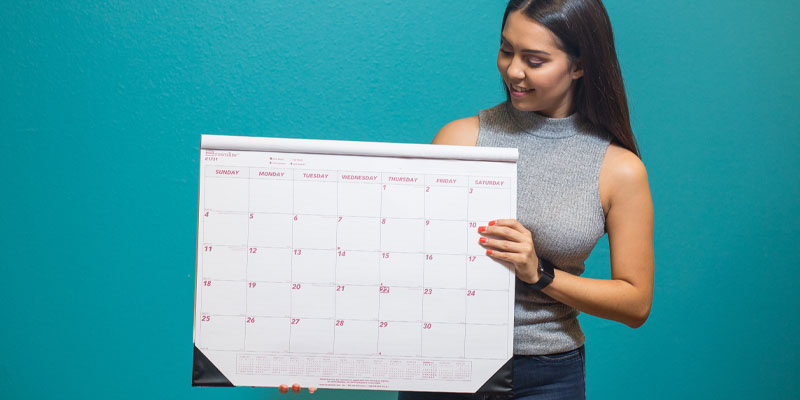
Who can’t use a few good scientific tips for de-stressing as we confront the coronavirus? Whether it’s the difficulty of working at home, being primarily confined to the house, addressing 24/7 childcare challenges, financial concerns related to loss of employment, or the justified worry about the trajectory of COVID-19, we all need to cope with uncertainty and new difficulties.
Below is a list of proven techniques for self-care. The work of neuroscientists, biologists and psychologists has provided essential insights so relevant for times like these.
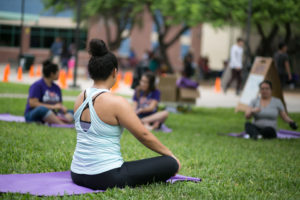 Move. Start your day with stretching, yoga, or dancing. Energize your body and mind for the tasks ahead. Walking for even 15 minutes before you sit down at your home computer will transform your mood and get your blood circulating. Our bodies are built to move and thank us in myriad ways! Want the science? Exercise will lower your blood sugar and insulin levels, release endorphins to improve your mood, strengthen your heart and improve your circulation. Further, weight-bearing movement fortifies your bones, boosts the immune system and makes you happier!
Move. Start your day with stretching, yoga, or dancing. Energize your body and mind for the tasks ahead. Walking for even 15 minutes before you sit down at your home computer will transform your mood and get your blood circulating. Our bodies are built to move and thank us in myriad ways! Want the science? Exercise will lower your blood sugar and insulin levels, release endorphins to improve your mood, strengthen your heart and improve your circulation. Further, weight-bearing movement fortifies your bones, boosts the immune system and makes you happier!
 Go outside. If you can take your morning walk in a park or other green space, it can put your body into a state of meditation, thanks to a phenomenon known as “involuntary attention.” This type of attention, which allows for reflection, reduces stress hormones.
Go outside. If you can take your morning walk in a park or other green space, it can put your body into a state of meditation, thanks to a phenomenon known as “involuntary attention.” This type of attention, which allows for reflection, reduces stress hormones.
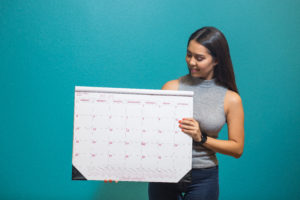 Schedule. Maintaining a plan will help you adjust to a different work-and-life home environment. It may be surprising, but the lack of a schedule is much more draining mentally, physically, and emotionally than any routine could ever be. The daily to-do list helps too.
Schedule. Maintaining a plan will help you adjust to a different work-and-life home environment. It may be surprising, but the lack of a schedule is much more draining mentally, physically, and emotionally than any routine could ever be. The daily to-do list helps too.
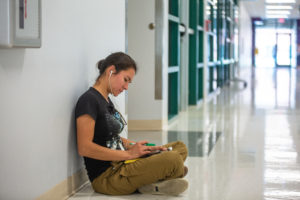 Be in the moment. Schedule breaks. You might consider the Pomodoro method of time management. Relaxation exercises such as long, slow breathing, journaling, listening to music (without multitasking) and practicing a rhythmic activity such as running, drumming or even chewing gum are very beneficial. Clinical and sports psychologist Leah Lagos, PsyD recommends several breathing techniques which allow us to stop and refocus.
Be in the moment. Schedule breaks. You might consider the Pomodoro method of time management. Relaxation exercises such as long, slow breathing, journaling, listening to music (without multitasking) and practicing a rhythmic activity such as running, drumming or even chewing gum are very beneficial. Clinical and sports psychologist Leah Lagos, PsyD recommends several breathing techniques which allow us to stop and refocus.
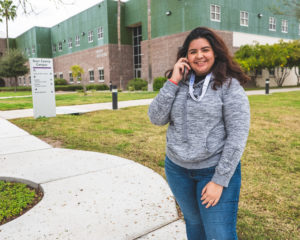 Embrace. Communicate with your instructors and fellow classmates, initiate online study groups and find ways to connect with the rest of humanity. Facetime, Facebook, Zoom, Google Hangouts, Skype and the good old telephone – connect and reconnect. Try something new. Without a commute, you may have new time on your hands and can take up new hobbies or finally research family history and locate new relatives. When was the last time you sent a favorite relative a real, snail-mail letter?
Embrace. Communicate with your instructors and fellow classmates, initiate online study groups and find ways to connect with the rest of humanity. Facetime, Facebook, Zoom, Google Hangouts, Skype and the good old telephone – connect and reconnect. Try something new. Without a commute, you may have new time on your hands and can take up new hobbies or finally research family history and locate new relatives. When was the last time you sent a favorite relative a real, snail-mail letter?
 Laugh. The age-old adage, “Laughter is the best medicine,” has a lot of truth. Science indicates it may be the most important de-stressor of all! When you laugh, your body releases endorphins making you more positive, happy and confident. Laughter inhibits the release of stress hormones such as cortisol, dramatically relieving stress and anxiety. Laughter also prompts your body to release more disease-fighting antibodies.
Laugh. The age-old adage, “Laughter is the best medicine,” has a lot of truth. Science indicates it may be the most important de-stressor of all! When you laugh, your body releases endorphins making you more positive, happy and confident. Laughter inhibits the release of stress hormones such as cortisol, dramatically relieving stress and anxiety. Laughter also prompts your body to release more disease-fighting antibodies.
 “Once you start laughing, it forces you to feel better,” said Dr. Suzanne Steinbaum, D.O. who adds that laughing decreases arterial inflammation and increases HDL, the “good” cholesterol.
“Once you start laughing, it forces you to feel better,” said Dr. Suzanne Steinbaum, D.O. who adds that laughing decreases arterial inflammation and increases HDL, the “good” cholesterol.
So, whatever tickles your funny bone is good! Cat videos, SNL, YouTube—it’s all just what the doctor ordered. For more ideas: The 25 Best Comedies of the 21st Century, Ranked by IndieWire; 32 of the Funniest Books Ever Written, by Esquire; The 57 Best Netflix Stand-Up Comedy Specials, and the “five best Jewish jokes ever”. Or the classic laugh-out-loud movies: Monty Python’s Life of Brian, Airplane!, Austin Powers, Some Like It Hot or The Naked Gun.
We are here to help!
General Information
[email protected]
Advising
[email protected] (include full name, A#, phone & email)
Counseling
[email protected]



